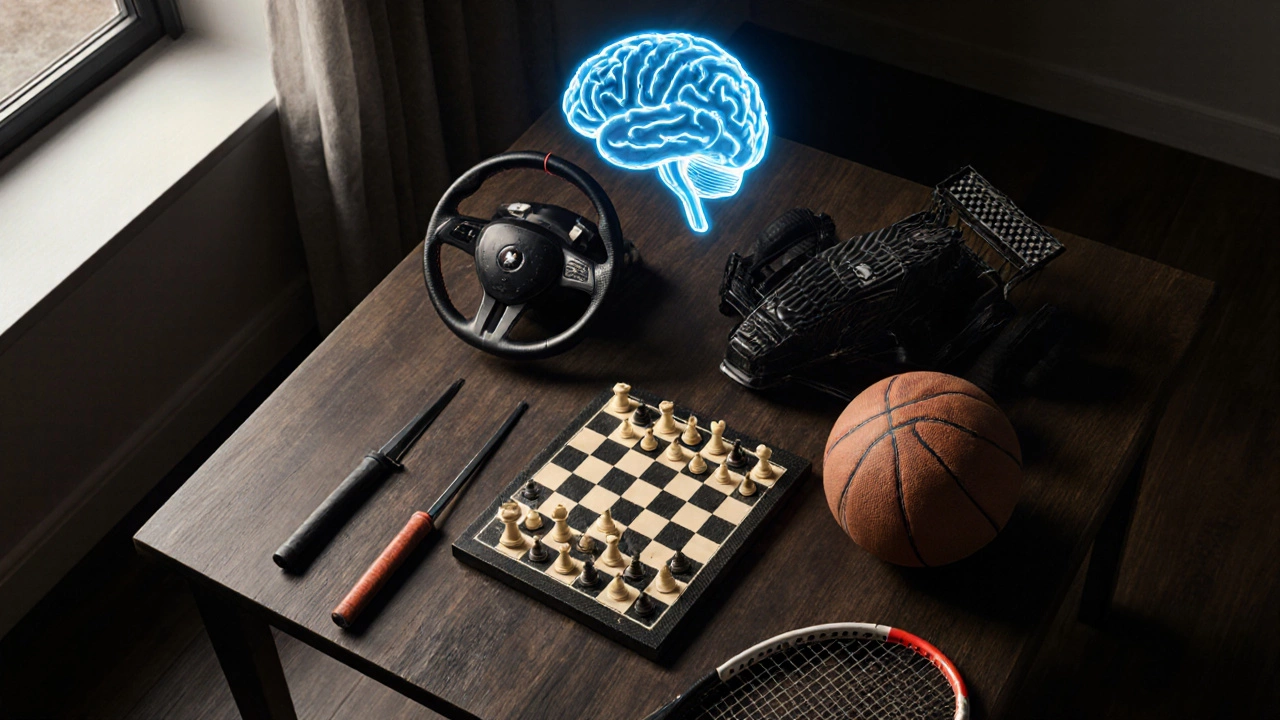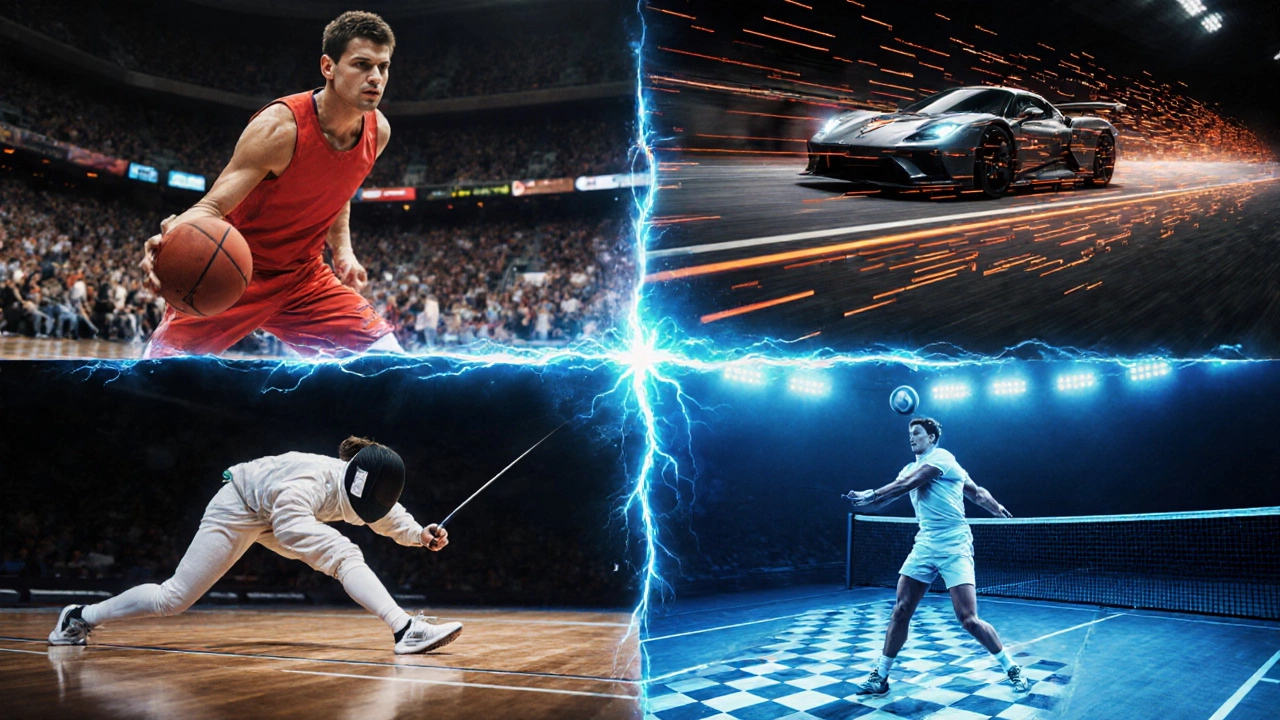Top Sports That Require a High IQ and Why
 Oct, 8 2025
Oct, 8 2025
High IQ Sports Analyzer
Analysis Results
Top High IQ Sports
Chess
Strategic foresight & calculation
High Strategic ThinkingFencing
Pattern recognition & split-second reaction
Quick ReflexesFormula 1
Spatial navigation & data synthesis
Data ProcessingBasketball (PG)
Game-flow analysis & play-calling
Team StrategyTennis (Sv-V)
Anticipation of return trajectory
Predictive ThinkingKey Takeaways
- Sports that blend physical skill with strategic thinking rank highest for IQ demands.
- Chess, fencing, Formula1 racing, basketball (point guard), and tennis (serve‑and‑volley) top the list.
- Each sport stresses a different mental facet: pattern recognition, spatial awareness, split‑second decision‑making, or long‑term strategy.
- Elite athletes often train their brains as intensively as their bodies.
- Developing cognitive skills-visualization, scenario planning, and reaction speed-boosts performance in any sport.
What Makes a Sport "High IQ"?
When we talk about IQ in sports we’re really talking about the brain’s role in processing information, predicting outcomes, and executing complex plans. A sport earns the "high IQ" label when it consistently demands one or more of these mental tasks:
- Strategic foresight: planning several moves ahead.
- Rapid pattern recognition: spotting recurring formations or opponent habits.
- Spatial navigation: visualizing trajectories in three dimensions.
- Emotional regulation: staying calm under intense pressure.
- Continuous learning: adapting tactics based on evolving data.
While physical fitness is always essential, the sports below excel at forcing athletes to excel mentally.

Top Five Sports That Rely on a High IQ
Below are the most cognitively demanding sports, each illustrated with a brief micro‑data definition.
Chess is a board game recognized as a sport that tests strategic planning, memory, and calculation speed. Grandmasters routinely score above 130 on standard IQ tests, and their rating systems mirror academic assessment.
Fencing is a combat sport where athletes must anticipate an opponent’s attack within milliseconds. The "blades mind" concept is real: top épée fencers often have a background in engineering or mathematics.
Formula1 Racing is a motorsport that combines high‑speed vehicle control with real‑time data analysis and strategic pit stops. Drivers process over 100 telemetry variables per second while calculating optimal overtaking windows.
Basketball (Point Guard) is a position that acts as the team’s on‑court strategist, directing plays and reading defenses. Elite point guards often have college‑level psychology or statistics knowledge to decode opponent tendencies.
Tennis (Serve‑and‑Volley) is a style that requires precise anticipation of opponent’s returns and split‑second footwork decisions. Players like John McEnroe famously used mental acuity to disrupt the rhythm of powerful baseliners.
Comparing Cognitive Demands Across Sports
| Sport | Primary Mental Skill | Typical IQ Range* (average) | Key Decision Speed |
|---|---|---|---|
| Chess | Strategic foresight & calculation | 130‑145 | Seconds per move (deep analysis) |
| Fencing | Pattern recognition & split‑second reaction | 120‑135 | 0.2‑0.4s per bout |
| Formula1 | Spatial navigation & data synthesis | 125‑140 | 0.01‑0.02s (steering inputs) |
| Basketball (PG) | Game‑flow analysis & play‑calling | 115‑130 | 0.5‑1s per possession |
| Tennis (Sv‑V) | Anticipation of return trajectory | 115‑130 | 0.3‑0.6s per rally |
*These ranges come from studies linking elite performance scores with standard IQ assessments. They illustrate trends, not hard rules.
Real‑World Examples of High‑IQ Athletes
Seeing the theory in action helps cement the idea that mental horsepower matters.
- Magnus Carlsen - Chess world champion with an IQ reported around 190. His ability to simplify complex positions is legendary.
- Valentina Vezzali - Italian fencer and multiple Olympic gold medalist who holds a degree in philosophy, proving a love for abstract thinking translates to the piste.
- Lewis Hamilton - Seven‑time F1 champion known for his data‑driven approach and rapid adaptation to changing track conditions.
- Chris Paul - NBA point guard whose pre‑game film study routine rivals that of a college professor.
- Roger Federer - Tennis legend whose serve‑and‑volley mastery relies on reading opponents’ body language and adjusting tactics mid‑point.
Developing the Brain for High‑IQ Sports
If you’re drawn to any of these sports, you can boost your mental edge with purposeful training.
- Pattern drills: Use video replay to identify recurring opponent moves. In fencing, for example, catalog three common attacks and practice counters.
- Visualization exercises: Before a race or match, mentally walk through the entire event, picturing every decision point.
- Cross‑training with puzzles: Chess puzzles, Sudoku, or strategic board games sharpen foresight without wear‑and‑tear on the body.
- Reaction‑time apps: Tools that light up random spots and require immediate taps improve the sub‑second reflexes needed in Formula1 or tennis.
- Stress‑management practice: Meditation or breathing routines keep the prefrontal cortex sharp under pressure, essential for point‑guard decision‑making.
Track progress the same way you log physical stats: record reaction times, note decision accuracy percentages, and adjust training intensity accordingly.
Choosing the Right Sport for Your Mind
Not every high‑IQ sport fits every personality. Ask yourself:
- Do you love deep, slow‑burn analysis? Chess or strategic sailing may suit you.
- Do you thrive on instant feedback and rapid movement? Fencing, Formula1, or tennis fit that craving.
- Do you enjoy leading teammates and reading group dynamics? Basketball’s point guard role could be your sweet spot.
Experiment with a few sessions in each discipline; the one that makes you lose track of time is likely the best match for your mental style.
Frequently Asked Questions
Do IQ tests accurately predict sports performance?
IQ captures general problem‑solving ability, which is a component of many sports. However, physical talent, discipline, and specific practice often outweigh raw IQ. Think of IQ as a helpful ingredient, not the whole recipe.
Can beginners develop the mental skills needed for these sports?
Absolutely. Cognitive abilities are trainable. Consistent pattern drills, video analysis, and mental rehearsal can raise decision‑making speed within months, even for novices.
Is chess really a sport?
International bodies such as the International Olympic Committee recognize chess as a sport because it meets criteria for organized competition, skill development, and physical endurance (mental stamina).
How much does training the brain cost compared to physical training?
Cognitive training is often cheaper: apps, books, and video analysis cost far less than gym memberships or equipment. The main investment is time and focused attention.
Which sport offers the highest blend of physical and mental challenge?
Formula1 tops the list because drivers must sustain extreme G‑forces while interpreting live telemetry, planning pit strategies, and reacting instantly to competitors.